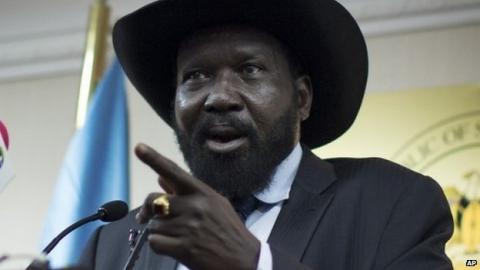Private Media, Government content
 Submitted by jbimokola on
Submitted by jbimokola on

Full story of media ownership in South Sudan: https://nanyombizaharah.wordpress.com/2018/06/23/private-media-government-content/#more-325
A culture of fear and silence continues to grow in South Sudan as media regulation and censorship dictate content output.
While the country has a media structure open to government, private and community media ownership, once set up, these channels face a tough regulatory environment where content favourable to the government line is allowed.
Fear and silence is all there is when this reporter approached different journalists working in South Sudan. Most of them are uncomfortable speaking for fear of being victimized in a country where journalists have been killed and where the National Security Services (NSS) has powers to detain reporters without trial.
President Salva Kiir has in the past been quoted by international media as saying journalists who report “against the country” would be killed.
“If anybody among journalists does not know that this country has killed people, we will demonstrate it one day, one time,” the president said in August 2015.
Between December 2013 when the war broke out and August 2015 when the fighting parties signed a short-lived peace deal, at least eight journalists were shot dead.
Own the channel, not content
Peter Mwai, a South Sudan journalist who lives in Kampala, says that anyone can own a media house in South Sudan, but the environment dictates what is published. Mwai himself had to leave his home country and he now edits PML Daily, an online news source in Kampala.
Dominic Kango, a journalist and researcher, explains: “Most of the media houses in South Sudan are privately owned but the content is government owned.”
Tom Rhodes, the East Africa representative for the Committee to Protect Journalists (CPJ), an international media rights group, was in 2015 quoted by the Foreign Policy, describing the press-freedom situation in South Sudan as “terrible.”
“Press laws ostensibly designed to protect the press, along with the constitution, are summarily ignored as security forces routinely harass and shutter journalist and media houses they deem too critical,” he said.
Radio Miraya, owned by the United Nations Mission in South Sudan and Eye Radio, run by the USAID, remain some of the dominant actors in South Sudanese radio industry. These are followed by the Catholic Radio Network which runs a string of radio stations across the country, and the Radio Community (TRC), supported by Internews.
But many of these haven’t been spared the wrath arm of censorship with threats such as closure. In March this year, for instance, the government suspended the operations of Radio Miraya, for allegedly failing to comply with media laws. Many other media houses have been shut down because of publishing and airing what government perceives as negative information against it.
The only television station in South Sudan—SSTV—is owned by the government along with Radio Juba, Voice of East Africa Equatorial, and Radio Jonglei among others. These are supposed to air only positive information about the government. While the South Sudan Broadcasting Corporation Act of 2013 has outlined the intention for state-owned broadcasters to become public service broadcasters, this remains a dream as the war and a restrictive environment reign.
Juba Monitor, the largest independent newspaper in South Sudan currently sells only about 2000 copies daily. Print media is not readily available beyond the capital Juba and remains inaccessible for large portions of the population due to low literacy rates and language barriers since most newspapers like Juba Monitor, Juba Times which are the most active ones are published in English. According to the UNESCO South Sudan country office, at least 70% of the population above 15 years are illiterate.
some newspapers are forced to removed or water mark some stories that are critiquing the government.
Only 27% can read the papers and they only operate in city because of war they cannot access far places (we're still listening 2015 report).
- Log in to post comments
- 983 reads
